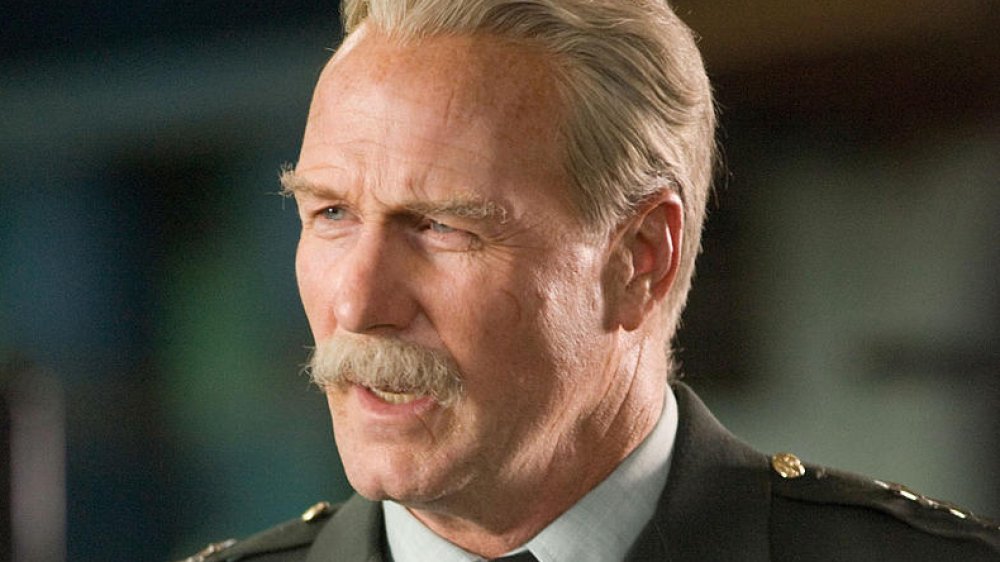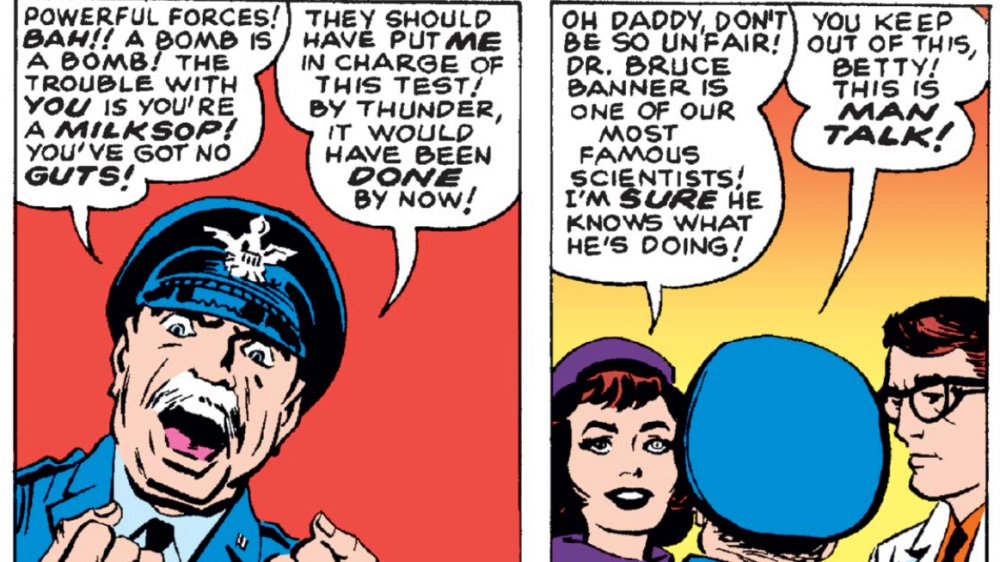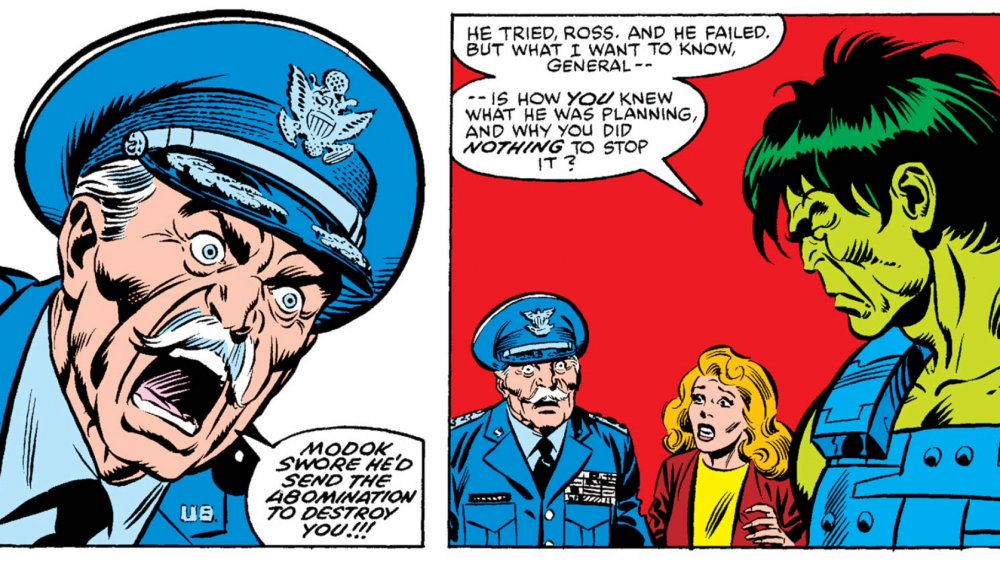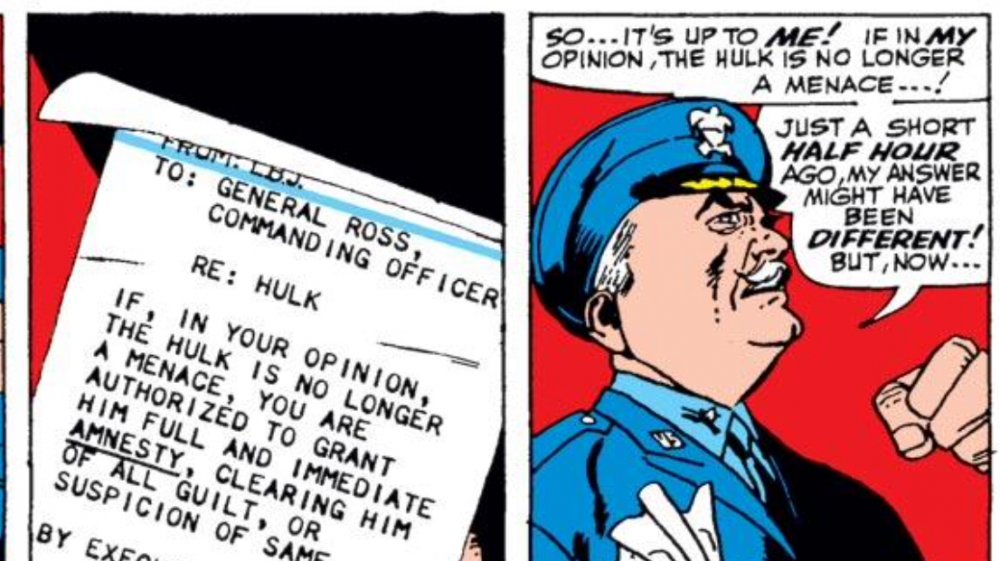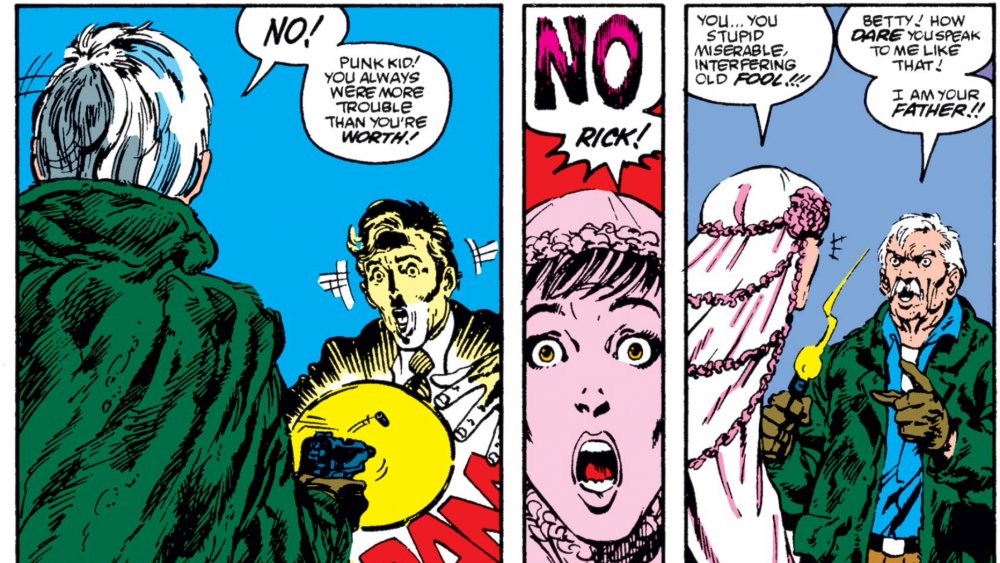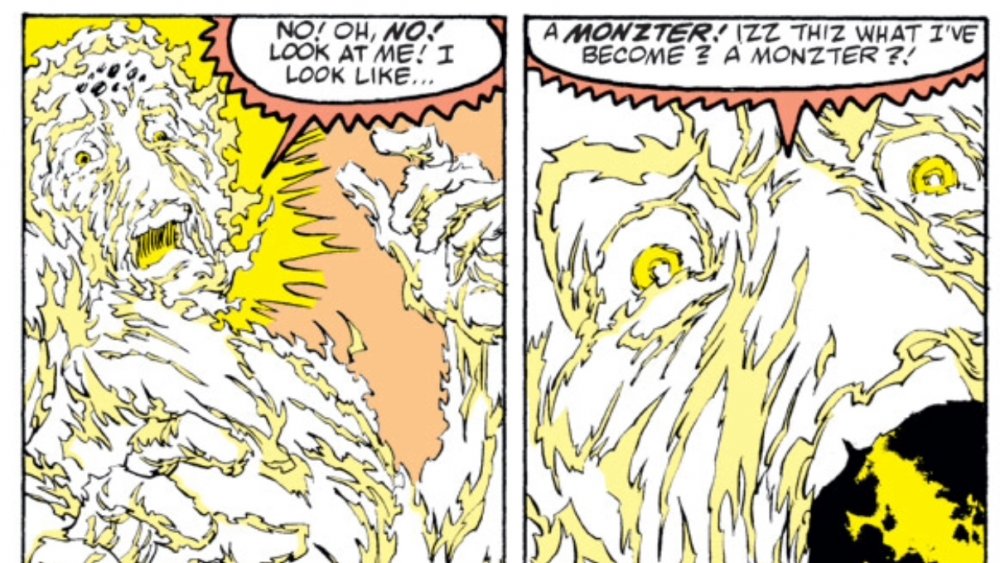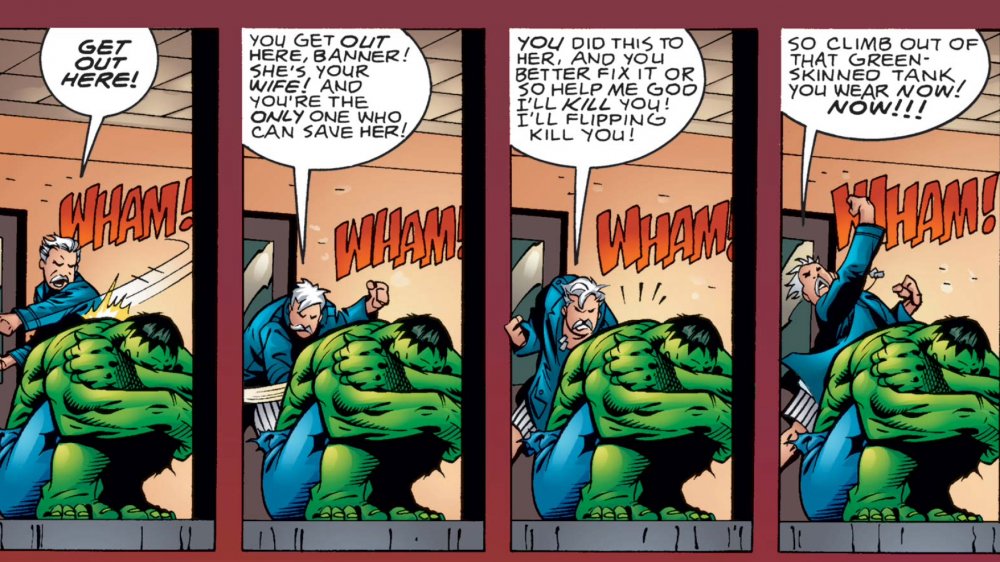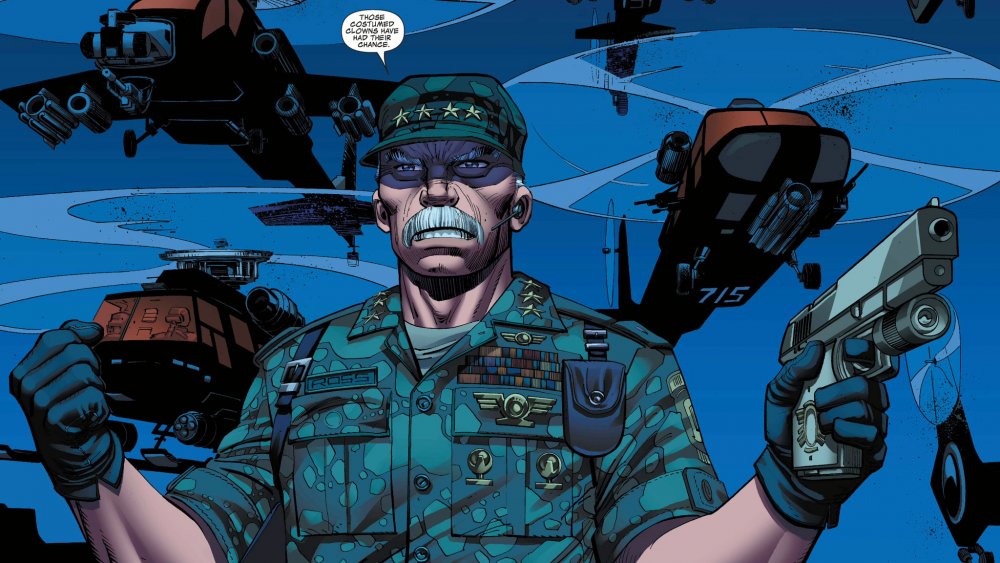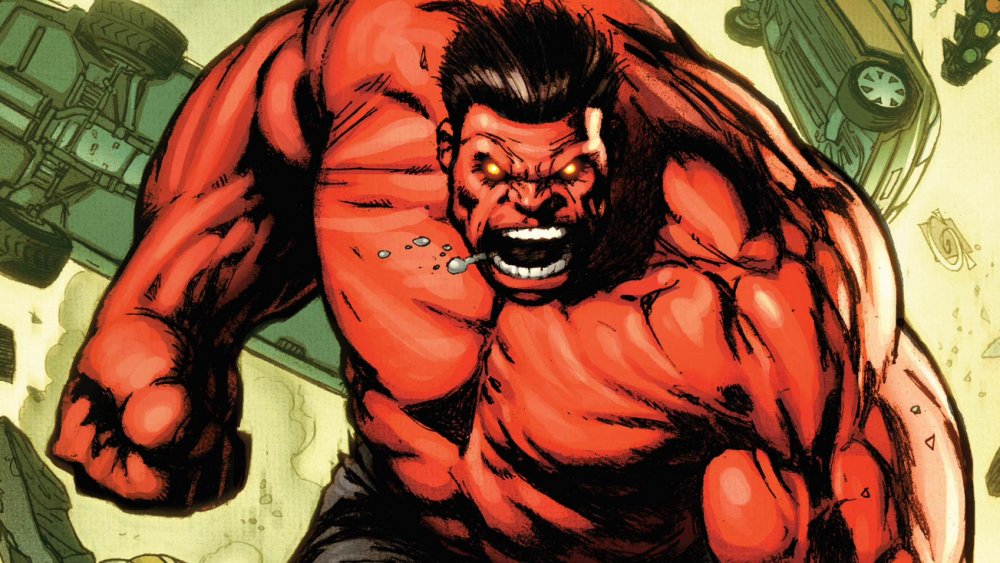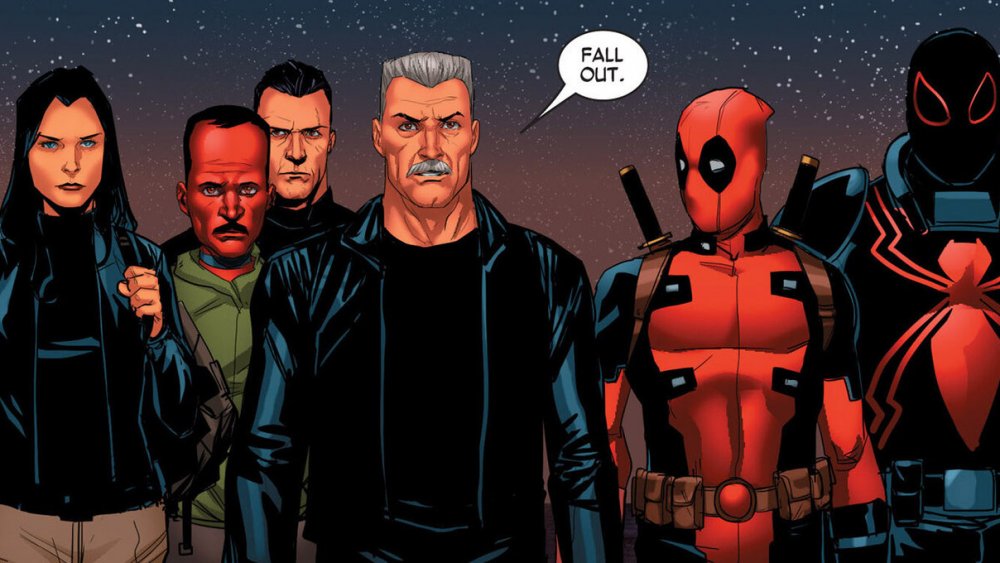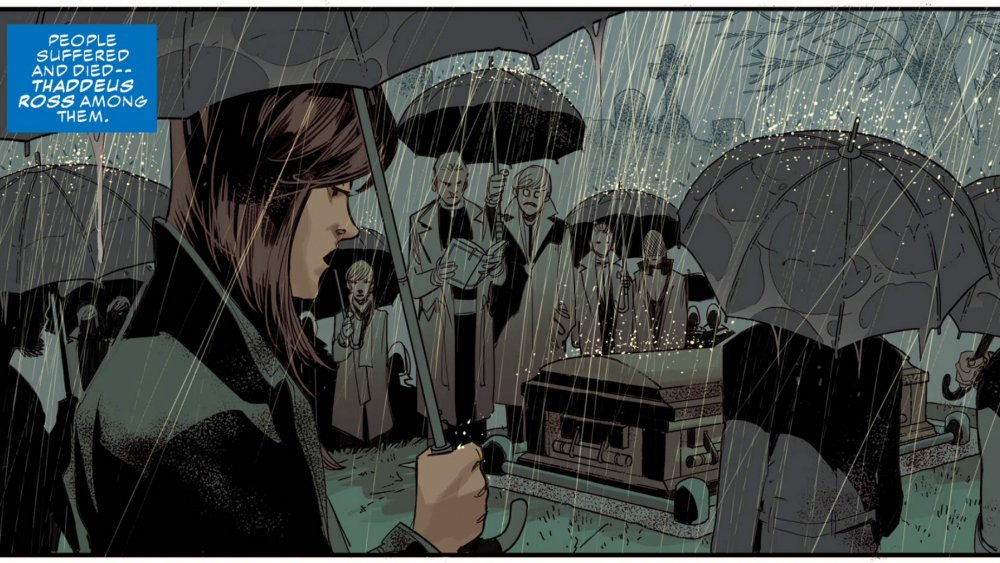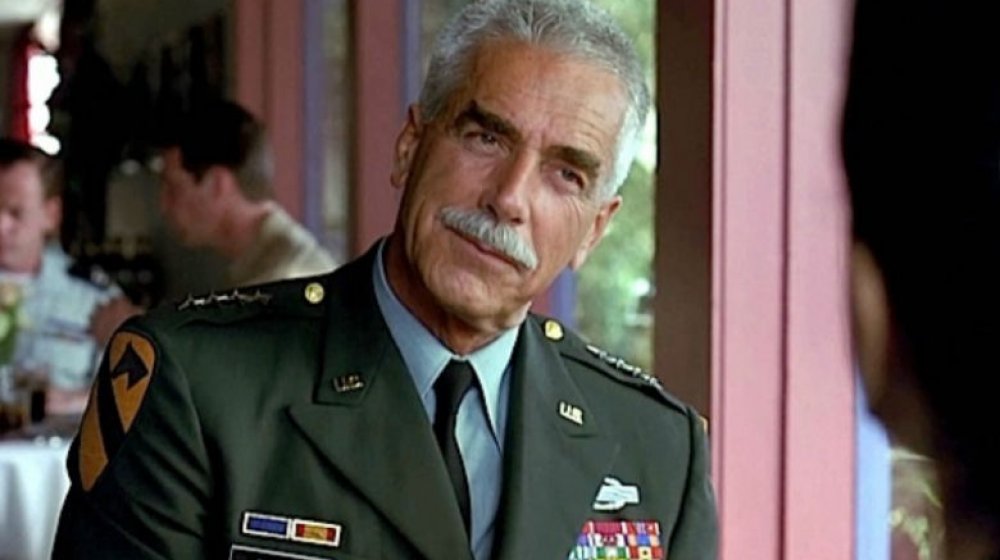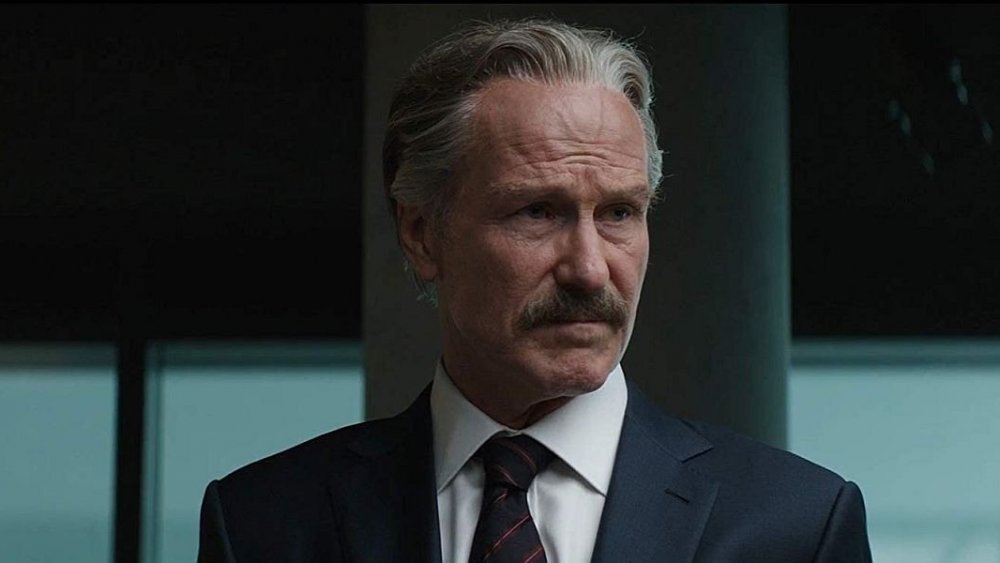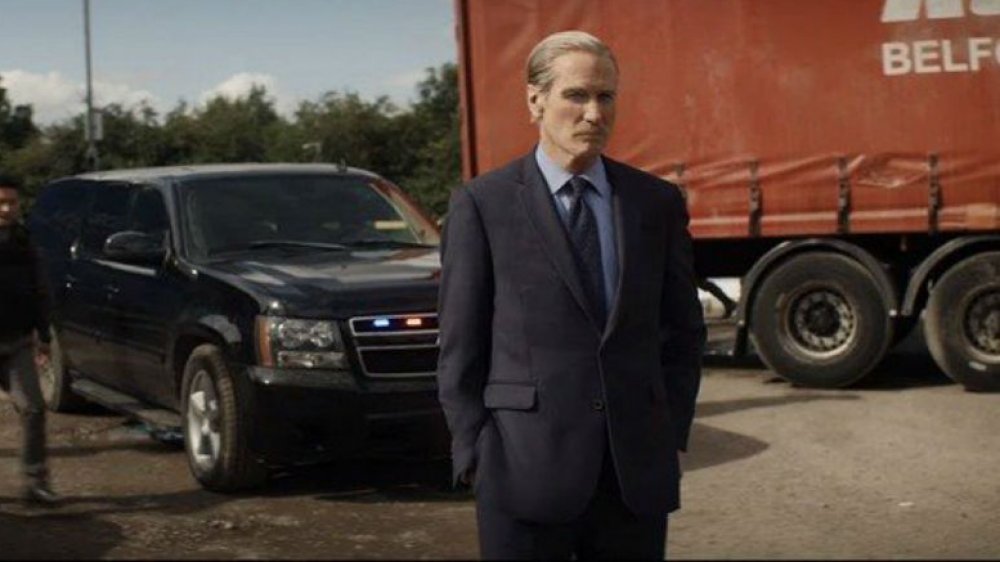The Untold Truth Of Thunderbolt Ross
Of all the film entries in the Marvel Cinematic Universe, 2008's The Incredible Hulk often feels like it's had the least lasting impact on the rest of the narrative. The change of actors from Edward Norton to Mark Ruffalo is the only leading role alteration of its type in the MCU. Seeds planted for future films never materialized, there isn't a sequel and there probably won't be, and principal characters failed to reappear.
The exception to all of that is Thaddeus "Thunderbolt" Ross, the former general who made it his obsession to capture and weaponize the Incredible Hulk. As the secretary of state, he's since turned his attention to the rest of the world's metahumans in hopes of either controlling or neutralizing them. Ross returned for a supporting role in Captain America: Civil War, had cameos in the last two Avengers entries, and appears in 2020's Black Widow.
So who is Thunderbolt Ross? Why has he endured as a staple in the MCU, and is it possible he could be more than an authoritative pain in the heroes' butts? Well, in the comics, Ross was there in the very beginning of Marvel's superhero renaissance, in 1962's Incredible Hulk #1. To find out how he's been a supporting character, a powerful supervillain, an Avenger, and more, keep reading for the untold truth of Thunderbolt Ross.
Thunderbolt Ross is one of Hulk's oldest enemies
General Thaddeus "Thunderbolt" Ross was there to see the birth of the man-monster that would cause him so much trouble in 1962's Incredible Hulk #1. Ross is an Air Force general initially tasked with the development of the Gamma Bomb, the brainchild of Dr. Bruce Banner. As soon as we meet Ross, he's a loud, obnoxious, pig-headed military man who can't stand Dr. Banner's intellect and caution, constantly barking insults at him. What's even more frustrating to Ross is that it's clear from the beginning that his daughter Betty is interested in this "milksop." It won't be long until Ross has his own preferred candidate for Betty's affections, Major Glenn Talbot, who eventually dies trying to kill the Hulk and would appear in Agents of S.H.I.E.L.D. played by Adrian Pasdar.
Ross has proven to be one of the Hulk's oldest and most persistent enemies. Even before he learns Banner and the Hulk are one in the same in 1967's Tales to Astonish #87, Ross has deep suspicions about Banner. In spite of Hulk and Banner's many heroic acts, Ross usually gives them no quarter. He pursues them later as head of the newly formed Hulkbuster Base, and he eventually goes even further.
Thunderbolt Ross' obsession with the Hulk led him to commit treason
There have been a few examples of Banner seizing control of his transformation into the Hulk. One of the more long-term examples is the era of the so-called "Banner Hulk," beginning with 1982's Incredible Hulk #272 and ending two years later when Banner's control over the big guy wains thanks to the machinations of the villain Nightmare.
But while Banner is still in control of his greener self, Ross conspires with the villain M.O.D.O.K. to murder him. At the end of 1983's Incredible Hulk #287, M.O.D.O.K. breaks into the military's "Project: Earthfall," killing everyone in his way. His goal is to free Hulk's old enemy, Emil Blonsky (aka the Abomination), and when he arrives, Ross is already there with his own plans for the gamma-irradiated villain.
Ross agrees to let M.O.D.O.K. take the Abomination without a fight in return for the big-headed villain using Blonsky to kill the Hulk. Ross isn't convinced Banner's control of the Hulk will stick, and he hopes Hulk's death will force his daughter to stop holding a torch for him and move on. Ross admits his treason in Incredible Hulk #289, and in Incredible Hulk #291, the old soldier considers shooting himself rather than facing the consequences of his treason. Instead, he willingly steps down and leaves his rank and the military behind.
Ross and the Hulk are sometimes allies
Ross is often portrayed as a narrow-minded blowhard, but he's not completely bereft of compassion or common sense. One early example is right after Ross and the rest of the world finally learn that Bruce Banner is the Hulk. The reveal comes in 1967's Tales to Astonish #87, and in the following issue, Ross receives a message from the president, directing him to offer Banner amnesty if Ross considers him not to be a threat. Unfortunately, just a few minutes before receiving the message, the villain Boomerang purposely antagonizes the Hulk until the man-monster goes on another rampage. We then learn from Ross that "just a short half hour ago," he may very well have granted Banner and his alter-ego the amnesty they needed. It's a surprising admission from someone so defined by his pursuit of the Green Goliath.
It wouldn't be the last time Ross set aside his pursuit of the Incredible Hulk for the common good. In multiple instances over the years, Ross has grudgingly and sometimes even happily accepted the Hulk's help against super-powered enemies that his forces couldn't realistically stand up to.
Ross almost became a murderer at his daughter's wedding
During a time when Bruce Banner was physically separated from the Hulk and thought he was free of the monster forever, Banner and the love of his life, Betty Ross, take the opportunity to finally tie the knot in 1986's Incredible Hulk #319, spurring Thunderbolt Ross to reappear after a long absence.
No longer a general, Ross appears in civilian clothing at the wedding. Just as the priest asks for anyone objecting to the union to "speak now" or keep it quiet, Ross yells "STOP!" and levels a handgun at the small gathering. Banner's old friend and best man, Rick Jones, rushes Ross, but the old soldier shoots Jones in the gut.
It's Betty who stops her father by standing between him and her husband-to-be. She releases a torrent of welled-up anger and truth at her dad, refusing to let him interrupt and insisting he kill her if he wants to kill Banner. Ross eventually relents, surrendering the gun to his daughter and collapsing to the floor, insisting he only wanted to make her happy.
Ross was transformed into a super-powered Hulk villain
Thunderbolt Ross is a guy who just can't learn his lesson, and he agrees to be fused with the form of the monstrous electrical villain Zzzax in 1986's Incredible Hulk #326. It happens during a brief period when the power of the Hulk is shared between Bruce Banner and his old friend, Rick Jones. That's when the new Zzzax-powered Ross attacks both of them while they're in the middle of a brawl. With both of them seemingly defeated in the following issue, Banner is able to get his rival to relent by pointing to Ross' reflection and showing him he's becomes just as much a monster as the Hulk.
Ross dies soon after, in 1987's Incredible Hulk #330. An unnamed mutant symbiote (not to be confused with the Venom symbiote) shows up at Gamma Base looking for powerful hosts like Doc Samson and the Hulk. Having now returned to his human form but still having Zzzax's powers, Ross jumps in between the symbiote and Betty. Once the symbiote has taken Ross over, the old soldier's control emerges long enough for him to turn Zzzax's power on himself, killing both Ross and the symbiote.
The death of of Betty Banner reignited his rage
After he's resurrected by the Soul Man, Ross returns with his rank restored in 1997's Incredible Hulk #455. Initially, Ross' new lease on life inspires a kinder, gentler method of dealing with the Hulk. He and Banner enjoy a brief friendship, and Ross is ready to play ball when the president offers Banner a deal that would keep him out of prison in 1998's Incredible Hulk #465. That all changes in the following issue with the tragic and unexpected death of Betty Banner. It's revealed in later issues that the Hulk's old enemy Abomination murders Betty by poisoning her with his gamma-irradiated blood.
Ross and Banner become enemies once more in the wake of Betty's death. At the end of 1999's Incredible Hulk #474, after the truth about Betty's killer is revealed and Hulk saves Ross from Abomination, Hulk turns into Banner and offers to let Ross kill him, saying he's ultimately still the one responsible for Betty's death. Ross seems more than ready to do the deed, but he relents because of his late daughter's love for Bruce.
Ross returned in World War Hulk
After the first volume of Incredible Hulk concludes in 1999, Ross' appearance in the Green Goliath's life is sporadic. But Ross finally returns with a true vengeance in Marvel's 2007 line-wide event World War Hulk. After being exiled from Earth by the secret superhero group the Illuminati, the Hulk returns in World War Hulk with an army of aliens and his gladiator allies, the Warbound, ready for payback.
At the end of World War Hulk #2 — after Hulk and his allies defeat the Fantastic Four and the Avengers — Ross rolls into New York City atop a tank with an army behind him. In the following issue, we learn Ross has managed to arm his troops with adamantium-tipped ammunition that can actually penetrate the Hulk's hide. Still, the Hulk tears through Ross' ranks with the conflict ending in a perfect character moment for Ross. The Hulk leaps up to the helicopter carrying Ross and pulls him out. In spite of his obvious defeat, as Hulk and Ross fall back to the ground, Ross continues to uselessly blast the Hulk in the face with his handgun, yelling, "Smash all you want! But we'll just keep coming and coming until someday we finally kill you!" The Hulk presumably takes the brunt of the fall, as Ross survives the drop.
He secretly became the Red Hulk
In the wake of World War Hulk, a new red-skinned and seemingly more powerful version of the Hulk shows up in 2008's Hulk #1. More ruthless and villainous than any past version of the character, the Red Hulk (or "Rulk" as he was sometimes known) enjoys two years rampaging through the Marvel Universe before his identity is revealed, and he beats the tar out of the original Hulk, Thor, Iron Man, and others along the way. Finally, in 2010's Hulk #23, we learn it's Thunderbolt Ross who became a Hulk to defeat a Hulk. The transformation was made possible by a group called the Intelligencia, a gathering of villainous geniuses like M.O.D.O.K., the Mad Thinker, and the Red Ghost. Ross agreed to it in order to get back at the Hulk, as well as the promise to bring his daughter Betty back to life. Betty does return and, in a reflection of her father's new abilities, becomes the Red She-Hulk.
In yet another act of treason, the Red Hulk invades and takes over the White House in Hulk #24. The original green Hulk arrives and finally defeats his foe in a one-on-one battle, an act that opens the door for the Red Hulk's redemption.
As Red Hulk, he became and Avenger and led the Thunderbolts
After the green Hulk defeats Ross, the military man is recruited by Captain America to undo some of his dirty work — specifically to deal with a "Scorched Earth" series of contingency plans his old allies in the Intelligencia put in place. Soon after, Captain America invites the Red Hulk to join the Avengers. Ross agrees, though his identity remains secret to most of his teammates. The Red Hulk proves an important addition to the team, including in line-wide events like 2012's Avengers Vs. X-Men.
In the wake of Avengers Vs. X-Men, Ross puts together a team that's much more in line with his way of doing things. Ross forms a new incarnation of the Thunderbolts, a team originally comprised of reformed villains in the '90s. In the case of Ross' Thunderbolts, most of his subordinates include Marvel characters more on the anti-hero side of things — e.g. Deadpool, Punisher, Venom — rather than reformed villains. The one exception is the Leader, who Ross turns into Red Leader when he infuses him with some of his energy to revive him after Punisher shoots him in the head. (Pro-tip: don't bring supervillains around Punisher if you need them alive).
Ross was murdered by the Foreigner
Ross is currently deceased in the comics. There have been hints of resurrection which haven't borne fruit, but if past history is any gauge, it's only a matter of time. But how did he wind up dead the first place?
Well, after an explosive clash with the Hulk in 2015's Hulk #14, Ross loses his Red Hulk powers, but that isn't the end of him. During the 2017 line-wide event Secret Empire, Ross leads an anti-Hydra resistance group. Because of this, after the smoke clears, Ross — in spite of being a traitor on multiple occasions — is once again recruited by the U.S. government. In 2018's Captain America #6, Ross is found murdered in his hotel room, and Captain America is framed for the deed. Eventually, an assassin known as the Foreigner proves to be the true culprit.
In the 2019 crossover Absolute Carnage, there were hints Ross would return. The symbiote villain Carnage seeks out every person on Earth to ever bond with a Klyntarian symbiote and steals Ross' corpse. But by the end of the event, Ross' body is returned to his grave, so for now, Ross is still taking a dirt nap.
Sam Elliott was the first to bring Thunderbolt Ross to life on the big screen
Before William Hurt was cast as the MCU's Thunderbolt Ross — before there even was a Marvel Cinematic Universe — Sam Elliott brought the character of General Thaddeus "Thunderbolt" Ross to life in 2003's Hulk. The film isn't one of the most well-loved superhero adaptations, but Elliott was the perfect choice for the role, and director Ang Lee wanted him right away. In a 2003 interview, Elliott said that Lee was shown footage of his work on the 2000 political drama The Contender, and Lee said, "That's the guy. That's the guy I want."
Elliott said he went straight to the comics for inspiration, and originally, that was all he had because Lee recruited the actor without a script. Speaking to BBC in 2003, Elliott said he approached the character through Ross' relationship with his daughter, explaining, "I'm a four star general in this thing, and you don't rise to the ranks of a four star general by hanging about the house being the perfect dad."
While Hulk remains a least-favorite superhero film for many, Elliott was clearly proud of the film. He said he would have "gladly" done the work without a script for the chance to work with Ang Lee and called Hulk a "powerful, dramatic tale."
William Hurt embodies Thunderbolt Ross for the MCU
When 2008's Incredible Hulk became the second entry in the brand new MCU, William Hurt was tapped to play General Ross, and his version of the character is far from a carbon copy of Sam Elliott's earlier take in Hulk. Hurt's character is quite a bit more cold-blooded than Elliott's. He certainly wants to protect his daughter, but he has a lot of other priorities, namely harnessing the Hulk's power. He also has an almost religious-like awe of the Hulk we haven't seen before in the character. In a deleted scene from Incredible Hulk, Ross compares witnessing the Hulk to "seeing the back part of God."
In 2015, Hurt said the version of Ross fans would see in the following year's Captain America: Civil War would be "a changed man," and he doesn't disappoint. When he appears in the film, instead of a general, he's now the secretary of state. As the man to deliver the Sokovia Accords to the Avengers' doorstep, you could argue this is a guy still concerned with capturing and controlling super-powered beings, but in 2008, he was threatening to drop Bruce Banner "in a hole" he'd never leave and ripping his powers from him. He still clearly sees metahumans as being both a threat and an opportunity, but his methods at least point to an older, wiser man.
Thunderbolt Ross is set to return in Black Widow
We don't know a lot yet about Thunderbolt Ross' role in the upcoming Black Widow. There were rumors about Hurt reprising his role for the film, which were finally confirmed in December 2019 with the release of the Black Widow trailer. As soon as his involvement was confirmed, the theories began churning out that somehow this would lead to the introduction of Red Hulk.
We don't know much yet — arguably, not even enough to intelligently speculate. But there is one interesting thing about Ross' brief appearance in the Black Widow trailer worthy of note. Marvel Studios has used de-aging technology successfully in multiple films, particularly in flashbacks or time-travel scenes in Ant-Man, Captain Marvel, Avengers: Endgame, and Guardians of the Galaxy Vol. 2. In the quick shot that shows us Thunderbolt Ross, he looks markedly younger, even younger than he does in Incredible Hulk. Yet he's in civilian clothing in a time where he would've still been in the military. It suggests at the very least that Ross' past in top secret operations goes much deeper than we already knew.
